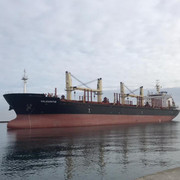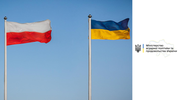News
The export of Polish onions to Ukraine increased 24 times
In the eleven months of 2022, there was an increase in the export volume of onion from Poland. In accordance with the Ministry of Finance preliminary data, from January to November 2022, 189 thousand tonnes of onion were exported from Poland, by 42% more than in the comparable period of 2021, mainly as a result of a significant (24-fold) increase in the export of onion to Ukraine (54 thousand tonnes, 28% of the export volume).
- Read more
- 831 reads
War risk insurance mechanisms should be launched to attract investors to Ukraine: Yuliia Svyrydenko in Brussels
Ukraine seeks to encourage private investment in its economy even before the end of the war. To do this, the country needs to introduce comprehensive war risk insurance for both foreign and domestic entrepreneurs. This was discussed during a meeting in Brussels between the First Deputy Prime Minister and Minister of Economy of Ukraine Yuliia Svyrydenko and Director-General of the European Commission's Directorate-General for Neighborhood and Enlargement Policy Gert Jan Koopman.
- Read more
- 1113 reads
Prime Minister urges heads of regional military administrations to prepare recovery projects as soon as possible
The list of the Government’s priority issues today includes rapid recovery and its financing. This was stated by Prime Minister Denys Shmyhal during a speech at an expanded meeting of the Presidium of the Congress of Local and Regional Authorities under the President of Ukraine, held on February 22 under the chairmanship of Head of the Office of the President of Ukraine Andriy Yermak. The Head of Government took part in the meeting online during a working visit to Lviv region.
- Read more
- 806 reads
UK extends tariff relief for Ukraine until early 2024
Britain said on Thursday it would extend temporary tariff liberalisation for Ukraine until early 2024, Reuters reports.
- Read more
- 1084 reads
NACP puts Auсhan on list of international sponsors of war
The National Agency on Corruption Prevention of Ukraine (NACP) put Auchan French retail group on the list of international sponsors of war.
“The reason is that during Russia’s full-scale invasion of Ukraine, the company refused to boycott the terrorist state and did not close its business in the Russian Federation,” NACP posted on Telegram.
- Read more
- 916 reads
Finland supports Ukraine’s grain exports
Finland contributes EUR 5 million to the World Food Programme (WFP) to support the implementation of the Black Sea Grain Initiative. With Finland’s support, WFP is buying grain from Ukraine and taking it to African countries affected by the food crisis.
- Read more
- 808 reads
“It is in the interest of European investors to develop synergies between Ukraine and Europe”, – Gilles Mettetal
Gilles Mettetal, a member of the Board of Directors of Astarta, became a speaker of the webinar “Agricultural Investing for Social and Environmental Impact: Building the Ukrainian Story”, organized as part of the Chapter Zero Ukraine and Caucasus initiative and dedicated to ESG investing in agriculture.
- Read more
- 1161 reads
Over 2.6m ha of farmlands must be demined in Ukraine
Ukraine may curb the production of agricultural products and food this year as more than 2.6 million hectares of farmlands require demining due to Russian aggression.
That’s according to Yuliya Svyrydenko, Deputy Prime Minister and Minister of Economy of Ukraine, who spoke in Brussels after the meeting of the Committee of Permanent Representatives of the EU (COREPER II), an Ukrinform correspondent reports.
- Read more
- 826 reads
Grain From Ukraine: Fifth vessel with Ukrainian grain sails to Africa
The VALSAMITIS bulk carrier with 25,000 tonnes of Ukrainian wheat to Kenya and 5,000 tonnes to Ethiopia has left the port of Chornomorsk. This is the fifth vessel under the Grain From Ukraine program, which aims to provide Ukrainian grain to countries suffering from hunger.
- Read more
- 723 reads
Ukraine and Poland discuss optimization of Yahodyn-Dorohusk border crossing point
The Ministry of Agrarian Policy and Food of Ukraine and the Ministry of Agriculture and Rural Development of the Republic of Poland held an online meeting on the export of Ukrainian grain through the territory of the Republic of Poland.
- Read more
- 843 reads

















